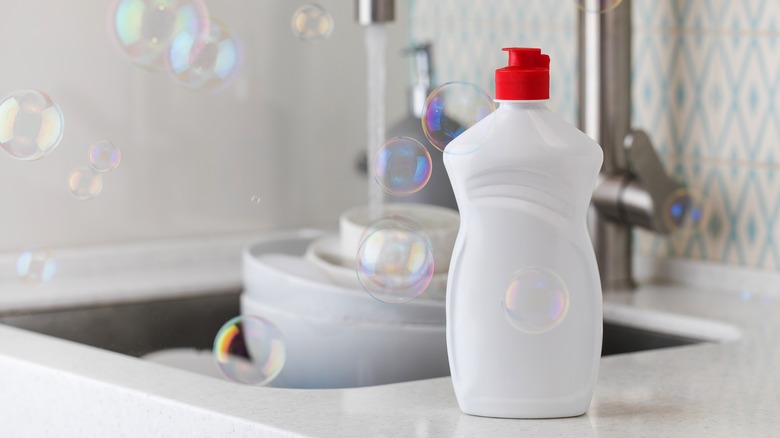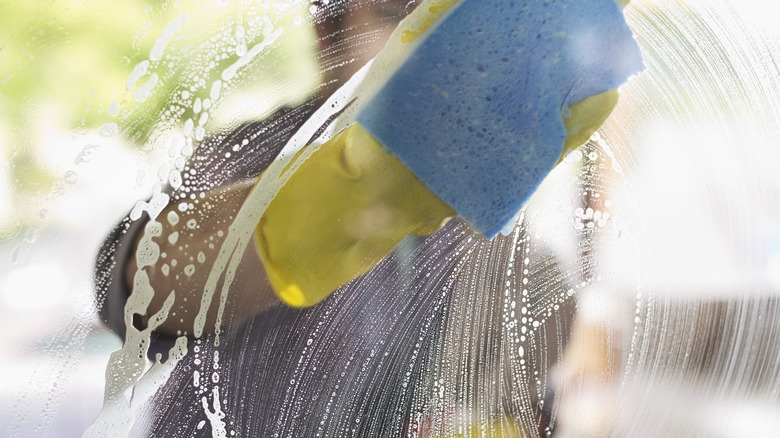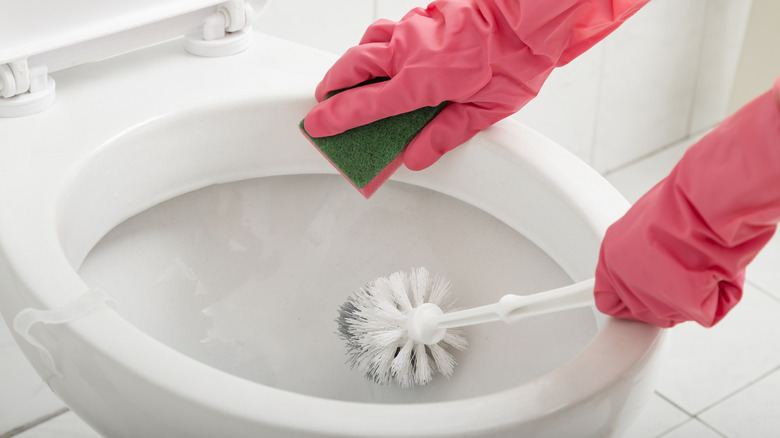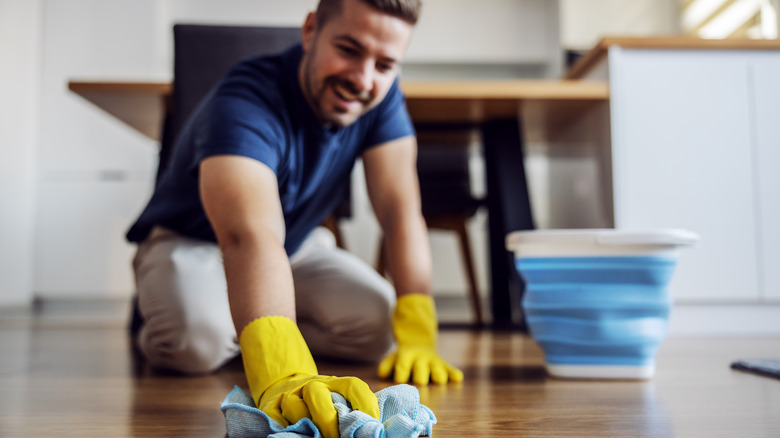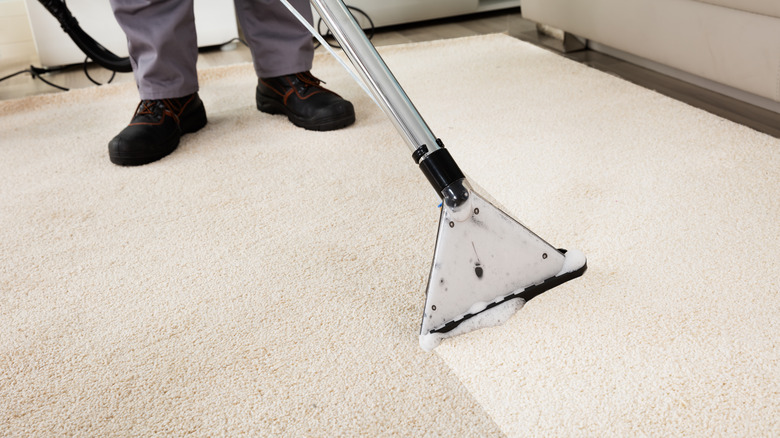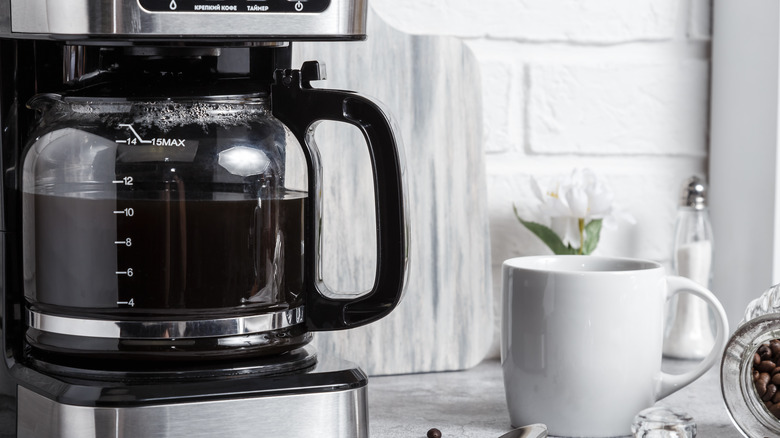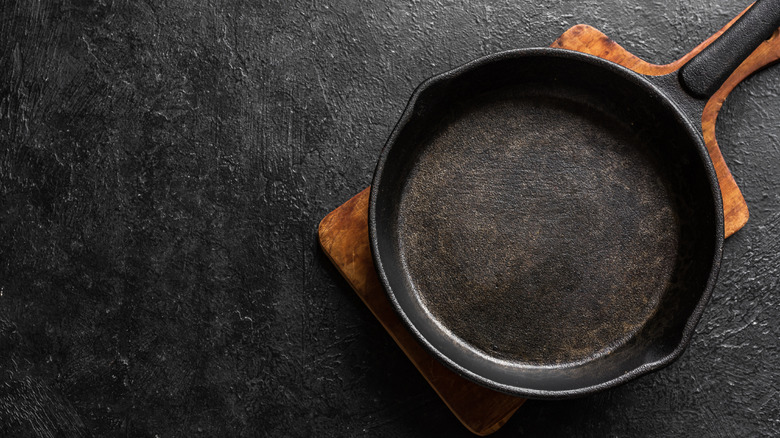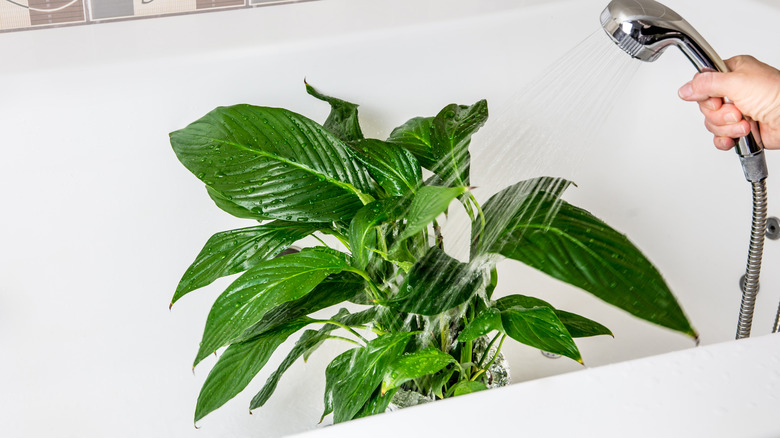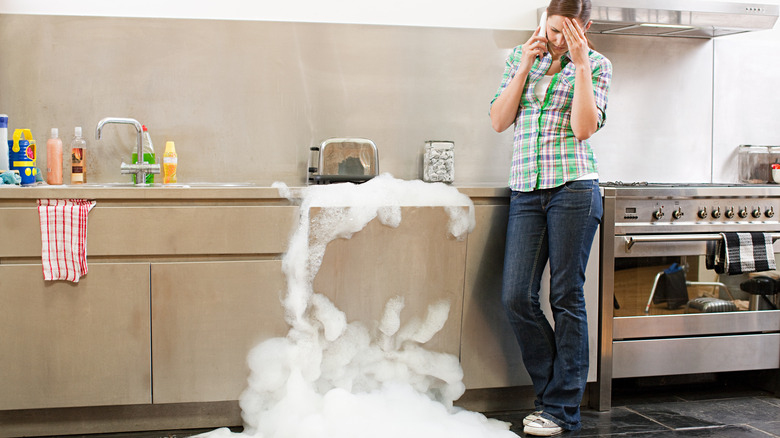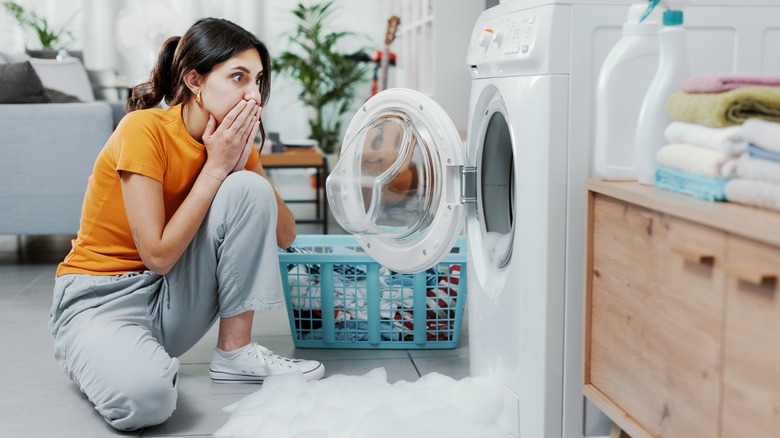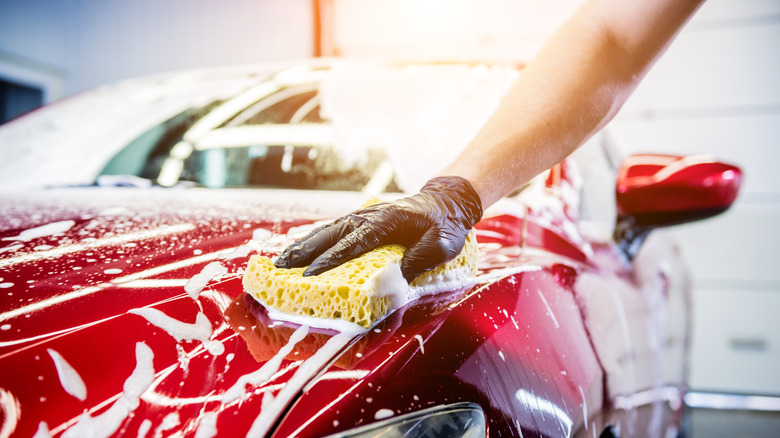Common Things You Should Never Clean With Dish Soap
With a name like dish soap, one would think the liquid they're washing their dishes with would be as safe as bar soap or liquid hand soap. However, dish soap is actually a detergent. Because of that, it has a stronger formula than the stuff made to use for some of the other cleaning purposes around our homes. In fact, something like hand soap, which is much milder, would make a great replacement when cleaning certain household items that might be damaged by dish soap. Dish soap is made to remove tough, greasy stains but it isn't gentle by any means (unless you're using Dawn or Palmolive, which claims to soften hands). Over time, you may notice your hands get dryer after you've done a few loads of dishes — it's that strong detergent drying your skin out, and it can dry out fabric, leather, and more.
The thing is, there are many places in your home where you shouldn't be using dish soap. It's easy to think that one soap can be swapped out for another in a pinch, but not all soaps and detergents are created equally. Let's take a look at some of the places in your home where dish soap may not be the best choice for cleaning.
Your windows
While you can, and some professionals do, use dish soap to wash your windows, you don't want to use too much. A few drops will do the trick in a bucket of water (be sure to mix it well). Too much soap will likely leave a messy residue unless you take a wet squeegee to rinse it off afterward. Plus, on hot, sunny days, the water will evaporate faster than the soap dries (even if you're using a small amount) and leave streaks behind. That's why it's often recommended to use rubbing alcohol or vinegar instead.
To create a vinegar cleaning solution, mix equal parts white vinegar with warm water in a bucket. The acidity in the vinegar will help cut through dirt and grime, as well as dissolve any soap residue from past cleanings. To create a rubbing alcohol cleaning solution, mix 1 part rubbing alcohol with 3 parts warm water in a bucket.
Your toilet
When it comes to keeping dish soap out of your toilet, it has nothing to do with washing your toilet bowl. If you're out of toilet cleaner, grease-fighting dish soap may be the perfect solution. Some believe that using it in your toilet could create a bubbly mess, while others swear that dish soap in your toilet can quickly clear out clogs, but that's not why toilets are on our list. There is one area of your toilet where you should never put dish soap, and that is the cistern, aka your toilet's tank.
The rubber and plastic parts in your tank can be damaged over time by dish soap. While it may seem like an easy and quick way to keep your toilet clean and smelling fresh, you're better off buying products made specifically for your toilet tank so you don't have problems down the road.
Your hardwood floors
When it comes to cleaning hardwood floors, most of us lean toward special floor cleaners. But, if you don't have any in stock in your pantry, can you use dish soap instead? It depends on whether your floors are sealed or not. If they aren't, you'll only want to clean them with floor waxes, natural oils, or even an oil soap. These products don't require much rinsing since water warps and damages unsealed wood. If you used water and soap, you would have to wash the floor once more with clean water to remove the residue, doubling down on the moisture.
If your wood floors are sealed, mix your dish soap with cool or room-temperature water (hot water mixed with soap can remove sealants). Aim for 3 parts water to 1 part dish soap. If you put in too much dish soap, you risk streaky, slippery floors. When you're done, you want to be sure to dry your floors well — turning on fans to add circulation will help. You don't want water to seep into your wood floors, causing discoloration in areas where the sealant may be worn down.
Your carpet
No hardwood floors to deal with in your home? That's fine, but you also may want to reconsider using dish soap in your carpet cleaner or for spot-treating stains. If you have a carpet shampooer and are thinking of using dish soap in it, think again. Carpet shampoo has the right amount of foaming and consistency to ensure it doesn't soak too much water into the carpet — and a wet carpet means future mold. Plus, dish soap leaves behind a different residue than carpet shampoo, making it more difficult to remove from the fibers.
For spills, you can get away with using a mixture of dish soap and water, but you don't want to add any more than 1 teaspoon of soap to 1 cup's worth of water to spot and scrub with. If the watery dish soap seeps deep into your carpet, it will become tacky, attracting dirt over time. If you spot clean with dish soap, shampoo your carpet later to remove the soap from the fibers. For some spills, things like soda water make a better cleaning option because they don't have a waxy residue.
Your leather furniture
If you're not new to leather furniture, you probably know that water and leather don't mix well. Using water, mixed with anything, to clean your leather can leave dark spots that never go away. But there's more to not using dish soap on your leather than a chance of discoloration. Leather is an interesting fabric, made from the skin of an animal. Because of this, it has a pH level that requires consideration when picking the right cleaning product. Its pH level is around 5, which is acidic, according to Leather-Dictionary.
Many cleaners tend to be more alkaline, meaning they have a higher pH level, which is not good for the fabric. When leather is tanned, alkalines are used to soften and break down the animal skin. That quick spot cleaning with your dish soap could begin breaking down your leather furniture, and over time, it will cause cracking and flaking. Use cleaners made precisely for leather cleaning and conditioning to keep furniture looking new. Why risk it when furniture is pricey to replace?
Your coffee maker
You can wash your coffee carafe with dish soap without issue since you'll rinse it well after soaping it up. However, you may want to reconsider putting any in the machine or through a cycle. Just like with your toilet tank, dish soap can start to break down some of the plastic parts inside your device over time. Plus, you'd need to run clear water through multiple times to ensure you won't end up with a bubbly cup of coffee, which is a whole process in itself. If dish soap is all you have on hand and your coffee machine needs a deep clean, use only 2 drops of dish soap mixed well in a full carafe of water (and run a few water-only cycles after).
There are also cleaners made specifically for use in coffee pots, or you can go with the old-school white vinegar and water mix, which is excellent for descaling coffee makers. Just be sure to run two cycles of plain water through to ensure your next cup of coffee doesn't have a hint of vinegar to the flavor. After all, vinegar is edible; soap is not.
Your cast iron cookware
When it comes to washing your cast iron cookware, there is some confusion regarding dish soap. It's always been said you should never clean these pots and pans with plain old dish soap, but it turns out you can. The reasoning behind the warning was that dish soap is made to remove grease, and cast irons use a layer of "seasoning," aka grease, to work their magic. However, a properly seasoned piece — one that has been coated with oil that was heated so many times it turned into a sealant of sorts –isn't going to have its seasoning washed away by a simple trip through the sink. If you wash your cast iron with soapy water, don't leave it soaking. Pans left wet for too long can start to rust.
However, if you want to play it safe, kosher salt, oil, with a bit of water are your best bets for a nice clean pan that doesn't taste soapy (because soap could stick to the seasoning in your pan, too). Rinse and scrub your pan first with plain water, then use the salt to clean away any stuck-on food, followed by re-seasoning with oil.
Your plants
Soap can kill small bugs with soft bodies living on your plants, like aphids and mites, but should you be using dish soap to do the dirty work? The resounding answer is no. Dish soap is a detergent, after all, one that dries up your hands when you use it too much. Even if you rinse the soap off after going after the bugs or battling dusty leaves, you still risk damaging your plant's leaves because the dish soap is made to remove grease, which will remove a plant's protective oils.
You can, however, use a gentler soap, like liquid hand soap. Cleaning leaves does more than help banish tiny bugs. It also cleans off the dust and dirt, allowing plants to look their best and better absorb nutrients from water and sunlight. To clean them, mix the hand soap in some warm water and gently clean each leaf with a soft cloth. Even though you don't need to do this often, just when your plant's leaves are looking dull, you still want to avoid harsher products like dish soap. Plants whose waxy coatings have been washed off are more susceptible to getting burnt in direct sunlight and cannot retain water in their leaves properly.
Your dishwasher
Yes, dish soap is a detergent, but it's not quite the same as the dish detergent made to go inside your dishwasher. You can clean your hand-washed dishes with dish soap all day long but never use it in your dishwasher. You'll likely end up with a bubbly mess if you do. That's because dish soap is formulated to be highly foamy, and since the appliance uses a ton of agitating water, the soap continues to sud. Dishwasher pods and detergents aren't made to foam, ensuring nothing spills from the appliance.
Are you looking to clean the dishwasher itself? While there are some parts of your dishwasher you should wash regularly, like the dispensers, you can do so by wiping them with a damp cloth. You can, however, clean the outside of your dishwasher with dish soap and water to remove streaks and kitchen grease. Just be sure to wipe it down with a damp, soap-free cloth after to remove all of the soap residue.
Your washing machine
Are you out of laundry detergent and need something to wash a quick load of laundry with? Do not grab the dish soap! First of all, dish soap is not made to clean the fibers of clothing; it's made to clean dishes. Dish soap can actually ruin certain clothing items, like silks and wool. Since it's formulated to tackle greasy dishes and caked-on food, it's likely too harsh for fibers. Once it sticks to said fibers, it's difficult to wash off, leaving a layer of soap scum. This is even worse if you have hard water, which guarantees the production of soap scum.
Dish soap is also highly concentrated, so it might take several rinses to properly remove it from your clothes, wasting water. Even then, you might feel a waxy residue on the pieces or notice that towels or fleece pieces seem matted rather than fluffy. It's best to skip since you won't get the desired results.
Your car
Washing your car at home saves money and a trip to the car wash, but you'll want to be sure you're using the right soap to wash your ride. Dish soap is not the right soap. Dish soap is abrasive and not made to play well with car paint. It will strip away any wax on your car that is preventing rust. Unless you plan to wax your vehicle every time you wash it, skip the dish soap.
In fact, Consumer Reports even advises people to pass on all household cleaning agents when it comes to washing their vehicles. Not only can more abrasive detergents wreak havoc on your paint job, but the top coat that protects the paint below can also slowly be stripped away. This can lead to yucky white patches on your vehicle. Instead, head to your local car care store and invest in some cleaning supplies made to keep your ride looking shiny and new. You may be investing a little more in cleaning supplies, but that investment will help keep your car looking nicer for longer.
